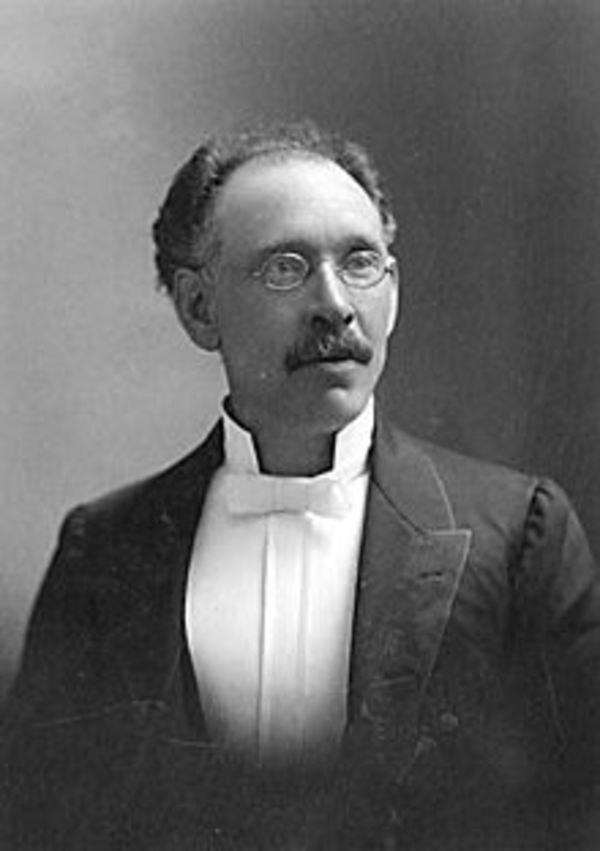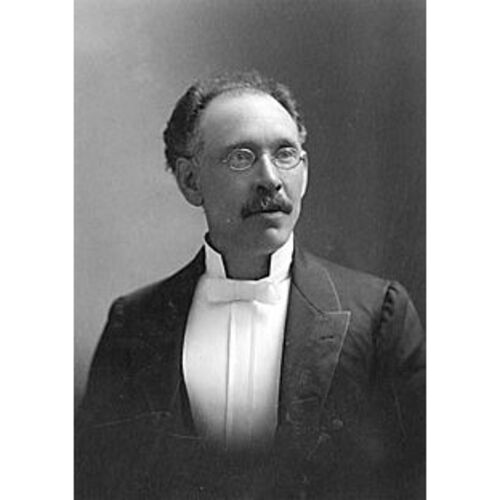
Source: Courtesy of Wikimedia Commons
MAXWELL, GEORGE RITCHIE, Presbyterian minister and politician; b. 11 Jan. 1857 in Stonehouse, Scotland, son of Cornelius Maxwell and Catherine Ritchie; m. 1883 Mary Forrest of Blanefield, Scotland, and they had four sons and two daughters; d. 17 Nov. 1902 in Vancouver.
Born the son of a Scottish miner, George Maxwell entered the coalmines himself at age 11. He later resumed his education, studying “Latin and Greek by the light of a miner’s candle, and attending night school after the day’s work that he might be enabled to go to college.” He achieved his goal in the late 1870s by enrolling at the University of Glasgow, where he studied classics, philosophy, and English literature. He did not graduate but apparently moved on to a theological college from which he emerged in 1880 as an ordained minister of the established Church of Scotland. He preached for a time in Ireland and Scotland before migrating in 1885 with his wife to Canada. After serving as a Presbyterian minister first at Saint-Sylvestre and Leeds Village, Que., and then at Trois-Rivières, Maxwell took charge of First Presbyterian Church, Vancouver, in December 1890, and held that position until 1896. The church centred an east-side neighbourhood of single male labourers and families of working class and lower middle class status.
Maxwell stands out as a reform-minded minister whose idealism and social concern led him from pulpit to political platform, and eventually, in 1896, into the House of Commons. At the root of his social activism was a religious philosophy that stressed the application of moral guidance to secular behaviour. Maxwell, in short, was one of those who took as their goal the desire “to do the greatest good to the greatest number.” In particular, as a self-proclaimed “son of labor” and “staunch friend of those who toil” he embraced the needs and aspirations of working people. Reformist rather than revolutionary, his ideals stressed the dignity of labour, the right of workers to fair wages and control of their work, the danger of corporate monopolies, and the value of social and economic democracy.
Maxwell’s rise to political prominence took place over a four-year period. Setting the stage was his open rejection of Canadian Conservatism, apparently in 1892. An “old country Conservative” of many years’ standing, he could no longer accept the moral decay, protection of privilege, and close identification with the interests of capital that in his view characterized the Conservative party in Canada. Brought up a British “free trader,” he found the government’s high tariff policy, which seemed to favour one class over another by serving the “enrichment of the capitalist,” to be especially unacceptable. Next, in April 1893 he spoke forcefully at a rally organized in Vancouver to air mainland grievances against the provincial government of Premier Theodore Davie*. He read a manifesto outlining local concerns, his leadership in this fight paving the way for a key role the following year in the establishment of the Nationalist Party, British Columbia’s first real labour party. Supported mainly by workers and embracing a platform of policies characteristic of Canadian labour radicalism in the 1890s, the Nationalist Party then joined other opponents of the provincial government to elect carpenter Robert Macpherson to the legislature in the general election of 1894. Two years later a coalition of Nationalist Party supporters, followers of D’Alton McCarthy*, and Liberals nominated Maxwell, the “guiding spirit” of the Nationalist Party, to run against the Conservatives in the federal riding of Burrard, a difficult constituency extending over 1,500 miles from Vancouver in the south to Atlin in the north. Elected by a slim majority in a three-way contest, Maxwell soon emerged as an independent rather than a regular Liberal and remained a leading representative of the Liberal-Labour alliance to be found in several centres across Canada at the turn of the century [see Christopher Foley].
Maxwell was a solid but undistinguished member of parliament. He spoke mainly on labour-related issues, supporting the union label, fair wages, the right of workers to unionize, freer trade, and public ownership of utilities. Like most west coast labour supporters, Maxwell argued passionately for laws that would restrict Asian immigration. He also spoke glowingly of Wilfrid Laurier*, both in the house and out of it, commending the prime minister for his enthusiastic support of the British empire, for his attempt to lessen trade barriers with Great Britain, for his resolution of the Manitoba school question in a way that preserved non-denominational education [see Thomas Greenway], and for his labour legislation.
But Maxwell is historically significant less as a national figure than as a representative of political forces in British Columbia. His policies were intensely parochial, an orientation that persisted from his defence of mainland interests against Victoria to his struggle to have a federal judge who would reside in Vancouver. He distributed patronage to party friends willingly and enthusiastically, in seeming contradiction of his oft-stated disdain for the corruption of Conservatives; as he said to salmon canner Henry Ogle Bell-Irving* in April 1902, “I am not going to give any man a trap licence or other licence who is not a supporter of the government and of myself.” In addition, his election and his policies reflected the prominence of class tensions in the political culture of British Columbia. He fought stridently with one group of businessmen in particular, fishing industry entrepreneurs whose opposition to trade unions instigated strikes by Fraser River salmon fishermen in 1900, and again in 1901 [see Frank Rogers]. The fact that salmon canners such as Bell-Irving generally supported the Conservative party made the Liberals appear especially attractive to friends of labour such as Maxwell.
On 23 Oct. 1902 George Maxwell returned home to Vancouver by train in a grave state, having been struck for the second time in three years by intestinal cancer. The illness now proved fatal. Until death he continued to be immensely popular in his adopted community, a man renowned as “an eloquent speaker and a keen debater” whose literary references and marvellous stories were always “a delight.” Above all, however, he remained known for his defence of local interests and admired for his unlimited sympathy towards working people.
City of Vancouver Arch., Add. mss 1 (Bell-Irving family papers), vol.25, 16 April 1902; vol.27, 29 Sept. 1903; vol.83, 13–14 May 1899. NA, RG 23, 83, 91–92, 102–3, 106–9, 111–14, 117–20, 122, 131–32. Univ. of B.C. Library, Arch. and Special Coll. Div. (Vancouver), Laurier papers relating to British Columbia (mfm. extracts from NA, MG 26, G), 1–3; M205 (Henry Doyle papers), box 1, docket 3; M662 (Vancouver Trades and Labor Council records), minutes, vol.1, 12 Oct. 1894, 1 March 1895, 10 April 1896. Univ. of Glasgow Arch., Student records. British Columbia Federationist (Vancouver), 27 Dec. 1912. Daily Colonist (Victoria), 17 Sept. 1896–23 July 1899. Daily News-Advertiser (Vancouver), 16 April 1893–26 Sept. 1897. Globe, 28 Dec. 1896. Independent (Vancouver), 11 Aug. 1900. Vancouver Daily Province, 20 Jan. 1900–18 Nov. 1902. Vancouver Daily World, 3 Dec. 1890–20 Nov. 1902. Victoria Daily Times, 18 Nov. 1902. Can., House of Commons, Debates, 1896–1902. Canadian directory of parl. (Johnson). Loosmore, “B.C. labor movement.”
Cite This Article
Robert A. J. McDonald and Jeremy Mouat, “MAXWELL, GEORGE RITCHIE,” in Dictionary of Canadian Biography, vol. 13, University of Toronto/Université Laval, 2003–, accessed February 20, 2026, https://www.biographi.ca/en/bio/maxwell_george_ritchie_13E.html.
The citation above shows the format for footnotes and endnotes according to the Chicago manual of style (16th edition). Information to be used in other citation formats:
| Permalink: | https://www.biographi.ca/en/bio/maxwell_george_ritchie_13E.html |
| Author of Article: | Robert A. J. McDonald and Jeremy Mouat |
| Title of Article: | MAXWELL, GEORGE RITCHIE |
| Publication Name: | Dictionary of Canadian Biography, vol. 13 |
| Publisher: | University of Toronto/Université Laval |
| Year of publication: | 1994 |
| Year of revision: | 1994 |
| Access Date: | February 20, 2026 |



